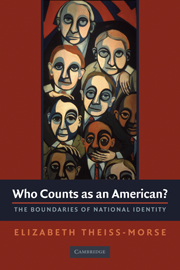Book contents
- Frontmatter
- Contents
- List of Figures
- List of Tables
- Preface
- 1 The Need for a Social Theory of National Identity
- 2 Commitment to the National Group
- 3 The Setting of National Group Boundaries
- 4 The Desire to Help the National Group
- 5 Loyalty in the Face of Criticism
- 6 Is National Identity Good or Bad?
- Appendix
- References
- Index
3 - The Setting of National Group Boundaries
Published online by Cambridge University Press: 05 June 2012
- Frontmatter
- Contents
- List of Figures
- List of Tables
- Preface
- 1 The Need for a Social Theory of National Identity
- 2 Commitment to the National Group
- 3 The Setting of National Group Boundaries
- 4 The Desire to Help the National Group
- 5 Loyalty in the Face of Criticism
- 6 Is National Identity Good or Bad?
- Appendix
- References
- Index
Summary
On February 9, 1950, Joseph McCarthy, the junior senator from Wisconsin, gave a speech to a Republican women's club in Wheeling, West Virginia. McCarthy used the speech to unveil a list of 205 individuals he alleged were communists working in the U.S. government. The major theme of the speech, though, was that the United States, a Christian nation, was under attack from godless communists:
Today we are engaged in a final, all-out battle between communistic atheism and Christianity. The modern champions of communism have selected this as the time, and ladies and gentlemen, the chips are down – they are truly down. … Can there be anyone who fails to realize that … this is the time for the show-down between the democratic Christian world and the communistic atheistic world?
(McCarthy 1950).The battle was a moral one between good Christian Americans and godless communist traitors who had been “born with silver spoons in their mouths” right in America. It was McCarthy's moral duty to cleanse the United States of these atheistic traitors.
McCarthy's short but potent career hunting down supposed communists in the United States government is revealing. He was a highly controversial figure during his time largely because his lists of supposed communist sympathizers were rarely backed up with any evidence, but most people agreed with his basic message if not his tactics: Communists were bad and, more important for the purposes of this research, America was a Christian nation.
- Type
- Chapter
- Information
- Who Counts as an American?The Boundaries of National Identity, pp. 63 - 94Publisher: Cambridge University PressPrint publication year: 2009



